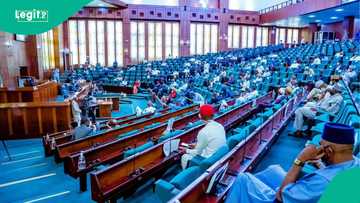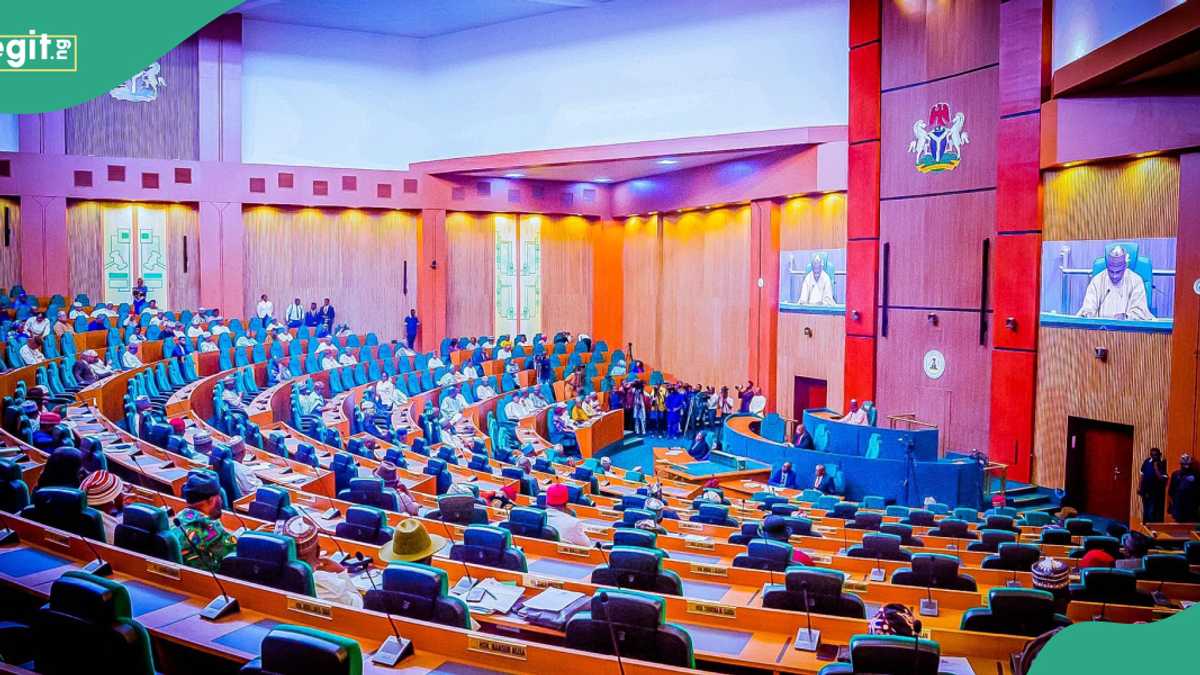Just In: Reps Dissolve Committee Investigating Adulterated Fuel Import, Details Emerge …C0NTINUE READING HERE >>>
The House of Representatives has decided to dissolve the current ad-hoc Joint Downstream and Midstream CommitteeThe committee, chaired by Ikenga Ugochinyere, faced internal disputes and calls for the removal of NNPC boss Mele KyariHowever, House Spokesperson Rotimi Akin announced that a new ad-hoc committee will be established to continue investigating the same issues
FCT, Abuja—The House of Representatives has decided to disband the current ad hoc Joint Downstream and Midstream Committee.
This committee was tasked with investigating issues related to the importation of adulterated petroleum products, the shortage of crude oil for domestic refineries, and other critical energy security concerns.
Chambers of the House of Representatives
Photo credit: @OfficialBenKalu
Source: Twitter
Reps express concerns over fuel scarcity, long queues
During the committee’s inauguration on the previous Monday, August 5, Deputy Speaker Benjamin Kalu, speaking on behalf of Speaker Tajudeen Abbas, highlighted concerns about the re-emergence of fuel queues, rising costs of Premium Motor Spirit (PMS), and the lack of crude oil for local refineries.

Read also
Reps give new order as NNPC move for additional $2bn in crude oil-backed loans
Kalu indicated that the investigation would address additional sector-related issues and stressed the importance of adhering to global standards for imported petroleum products, The Punch reported.
Reps move for rigorous testing of petrol products
He emphasized the need for rigorous testing by the Nigerian Midstream and Downstream Petroleum Regulatory Authority and the Standards Organisation of Nigeria to ensure that all imported petrol meets the required sulfur and octane levels.
He directed the joint committee to examine the quality and the number of laboratories used by the Nigerian Midstream and Downstream Petroleum Regulatory Authority (NMDPRA) and the Standards Organisation of Nigeria (SON) for testing and to provide actionable recommendations.
Reps disagree over committee’s roles, sack of NNPCL boss
Since the investigation commenced, the House has encountered controversy, with lawmakers forming various factions and groups.

Read also
FULL LIST: Protesters list demands to stop the August nationwide protest
The ad-hoc committee, chaired by Ikenga Ugochinyere, head of the House Committee on Petroleum Downstream, had been advocating for the removal of Mele Kyari, the Group Chief Executive Officer of the Nigerian National Petroleum Company Ltd.
However, another bloc of 50 lawmakers, led by Billy Osawaru from Edo State, opposed this move, arguing that demanding Kyari’s removal amid an ongoing investigation goes against parliamentary norms.
Ad-hoc committee to probe adulterated fuel dissolved
However, on Monday, August 5, in Abuja, House Spokesperson Rotimi Akin announced that the ad-hoc committee had been dissolved, and a new committee would be formed to continue the investigation, BusinessDay reported.
He stated:
“The House of Representatives leadership has decided to disband the existing ad-hoc Joint Downstream and Midstream Committee.
“This committee, which was originally responsible for examining the importation of adulterated petroleum products, the shortage of crude oil for domestic refineries, and other crucial energy security matters, will be replaced by a newly formed ad-hoc committee with the same objectives.”

Read also
Arik air reacts to FG’s decision to ground its operations, speaks on hike in travel cost
Reps amend Police Act in favour of IGP
In another development, Henzodaily.ng reported that on Tuesday, July 23, the House of Representatives amended the Police Act to allow the Inspector General of Police (IGP) to stay in office beyond retirement age.
According to the lawmakers, the amendment followed a request from President Bola Tinubu.
Source: Henzodaily.ng
>
